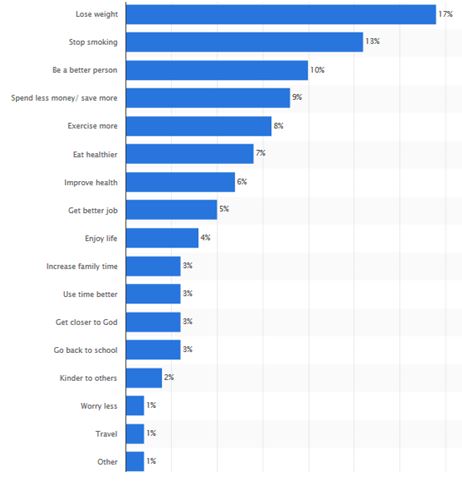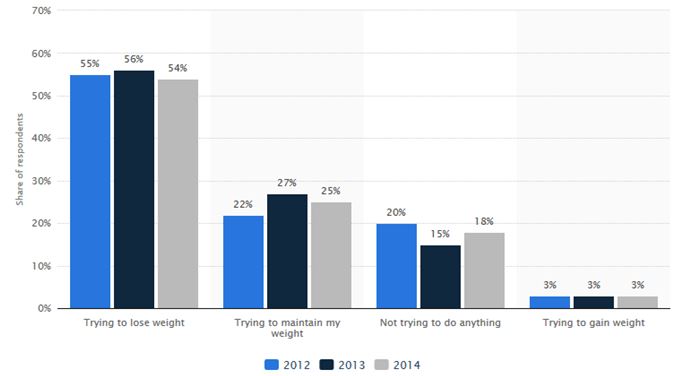Background Information
Many Americans are inclined to mention their decision to lose weight in New Year resolutions because this point is associated with their intentions to improve themselves. However, there is a lack of research on the success of these Americans to achieve their goal. The general statistics on the topic is mainly available, and these data present the information only on the Americans’ focus or absence of focus on their resolutions.
However, it is important to state that New Year resolutions are important motivating factors because persons focus on setting objectives and planning ahead. The clear goal and intention reflected in New Year resolutions are important for persons planning to keep a diet (McKittrick 1). Thus, it is significant to research the effects of New Year resolutions on people’s success in weight management.
Research Question
What effects have New Year resolutions on people’s decisions and actions associated with weight management?
Hypothesis
If people mention the goal to lose weight in their New Year resolutions, their achievements in weight management change.
Predictions
If people mention the goal to lose weight in their New Year resolutions, they will try to lose weight more actively than in the situation when they fail to formulate this goal. The high achievements in weight management depend on the goals formulated as New Year resolutions.
Data
The data to test the hypothesis are retrieved from the Statista website. The provided graphs demonstrate the percentage of the U.S. respondents who mentioned the goal to lose weight for the year of 2013 and percentage of the U.S. respondents who attempted to manage their weight in 2012, 2013, and 2014.
Findings
To answer the research question and test the hypothesis, it is necessary to focus on the data for the year of 2013 presented in two graphs. 17% of respondents mentioned the goal to lose weight in their New Year resolutions for 2013 (Figure 1). This goal is the most popular for resolutions that year. According to the data for 2013, 56% of respondents focused on losing weight in 2013. This percentage is higher than percentages for 2012 and 2014 years (Figure 2).


Following the New Year resolutions for 2013, focusing on the percentage of respondents willing to lose weight and on the percentage of respondents who really took actions to lose weight in 2013, it is possible to observe positive tendencies in respondents’ attitude to weight management. It is possible to state that the process of setting the clear goal to lose weight is one of factors to influence the person’s success in weight management while focusing on the aspects of will, persistence, and self-organization.
Conclusion
It is found that New Year resolutions have positive effects on people’s decisions and actions associated with the process of losing weight. The data and findings support the predictions that formulating the goal to lose weight in their New Year resolutions, people pay more attention to taking real actions to lose weight during the next year.
The presented data for 2013 support this conclusion because the high percentage regarding the respondents’ attempts to lose data in 2013 can be explained with the fact that respondents were highly motivated to act decisively. One of the influential motivating factors for this year is the goal to lose weight mentioned by the majority of respondents. Thus, New Year resolutions have positive effects on motivating people to take actions.
Works Cited
McKittrick, M. New Year’s Resolution: Lose Weight and Keep It Off. 2008. Web.
U.S. New Year Resolution for 2013. 2013. Web.
U.S. Respondents Goals in Weight Management, 2012-2014. 2014. Web.